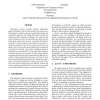Free Online Productivity Tools
i2Speak
i2Symbol
i2OCR
iTex2Img
iWeb2Print
iWeb2Shot
i2Type
iPdf2Split
iPdf2Merge
i2Bopomofo
i2Arabic
i2Style
i2Image
i2PDF
iLatex2Rtf
Sci2ools
111
click to vote
PADS
2000
ACM
2000
ACM
Distributed, parallel simulation of multiple, deliberative agents
Multi-agent systems comprise multiple, deliberative agents embedded in and recreating patterns of interactions. Each agent’s execution consumes considerable storage and calculation capacities. For testing multi-agent systems, distributed parallel simulation techniques are required that take the dynamic pattern of composition and interaction of multi-agent systems into account. Analyzing the behavior of agents in virtual, dynamic environments necessitates relating the simulation time to the actual execution time of agents. Since the execution time of deliberative components can hardly be foretold, conservative techniques based on lookahead are not applicable. On the other hand, optimistic techniques become very expensive if mobile agents and the creation and deletion of model components are affected by a rollback. The developed simulation layer of JAMES (a Java Based Agent Modeling Environment for Simulation) implements a moderately optimistic strategy which splits simulation and ext...
Related Content
| Added | 01 Aug 2010 |
| Updated | 01 Aug 2010 |
| Type | Conference |
| Year | 2000 |
| Where | PADS |
| Authors | Adelinde Uhrmacher, K. Gugler |
Comments (0)

